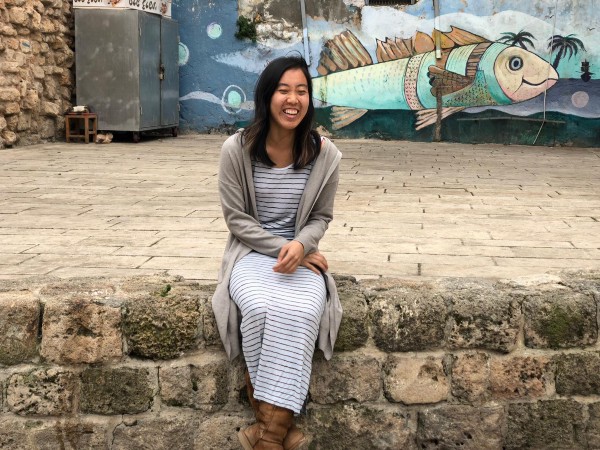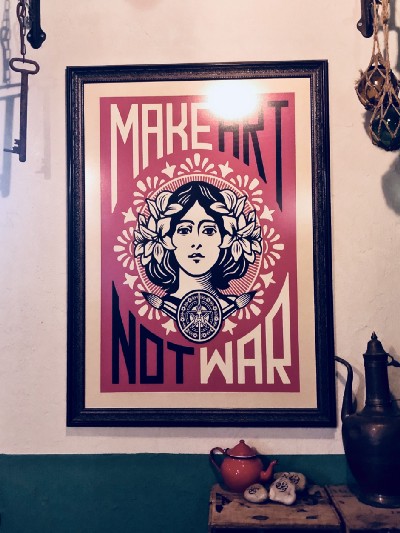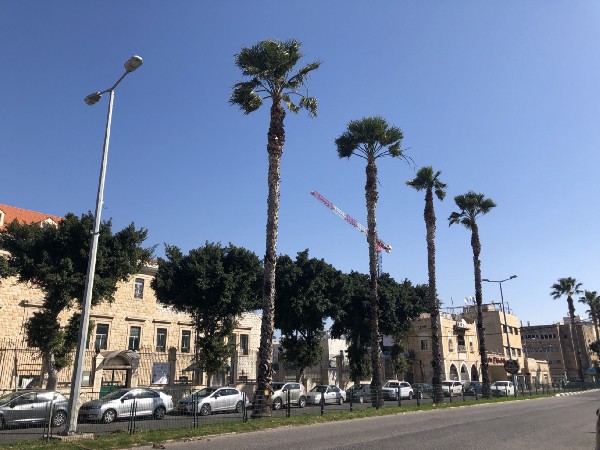Slow reflections on twenty-five days across Israel-Palestine
Today is my first true lazy day in weeks, and I am determined to schedule nothing, to go slowly, and to listen to the whims of my heart. Already I’m feeling the settledness in my body as rootedness in my feet and calm in my heart, and the fog in my mind is lifting.
I sit at a cafe around the corner from my house, and the oatmeal I am eating soothes my soul. There is coconut and cinnamon and banana mixed in, and each bite is a reunion with the earth: the cereal fields of Spain and the banana trees of Hawaii and the spice fields of Asia. It is a peaceful moment.
I want to capture for you the beauty of what has transpired here in Israel-Palestine since my arrival on January 16th: the moments of joy, sorrow, surprise, and purpose that make up a life, my life.
Before I jump into storytelling, here’s a brief summary.
Project Sabaya
My dream of starting a trade school in Bethlehem is manifesting as an after-school coding program at a Beit Jala high school. I’ve established partnerships with the Jerusalem School Bethlehem for providing a location and the Palestine Ahliya University for issuing a certificate of completion, and have received the first three applications (all from young women!).
Project Resilience
With our team, Joann and I have completed the first week of Community Resiliency Model (CRM) trainings in Haifa, training Palestinian women from the Arab Halisa neighborhood in the resiliency tools. The first meeting had over sixty people! The following two meetings were the beginning of a month-long workshop, which has a goal of training 15–20 community members in utilizing the tools in their own lives and sharing them with others. We’ll be in Haifa for the rest of February, then will spend March in Jerusalem and Bethlehem with two community organizations: Social Workers for Peace (Osim Shalom) and a women’s group based in Beit Sahour.
Project Melanie
I reunited with good friends, moved into two different homes (one in Jerusalem and one in Beit Jala), conquered my fear of elevators, danced at two Kabbalah Shabbats, discovered a community center for folks that identify as LGBTQ, whirled with a group of Sufi dervishes, and prayed at my first mosque. And for the first time, I was able to stab myself with an epipen after an allergic reaction to nuts!
And now, here are a few stories from my life.
Days 1–2: Welcome to Jerusalem (Ahlan wa sahlan)
It is snowing on day 1, my first full day in Jerusalem, and Lisa arrives from the darkness of winter as a fairy god-sister might: carrying groceries, good news, and a magical vehicle to whisk me off to Ein Karem. In her forest dwelling, we share a midnight meal of breads, fruit, and hummus, and an invitation to touch our own hearts. I am weary in body and mind, doubtful of my purpose here and missing my family back in Los Angeles and San Francisco. I feel disconnected from this land, and pray to the universe for a reminder of why I am here.
On day 2, Lisa and I head into school and I receive my answer. In Lisa’s office, we meet two students, Anas and Mohammed, and we bear witness to their wisdom, playfulness, and joy. The boys play-wrestle, act, and discuss politics and philosophy. In their presence, I touch my own child self: my curiosity and joy about the world, my own uncertainty and fear. I remember that I am here to be a witness to these kids, to all that they are, and to cultivate good seeds in them and in me.
By afternoon, I reconnect with Mr. Francis, the school’s technology director, and he introduces me to Mr. Josh, the principal of our sister school in Beit Jala, near Bethlehem.
Our idea is to create an after-school coding program at Mr. Josh’s school, which will make the program accessible to kids at the refugee camps and across Bethlehem. Within minutes of our meeting, Mr. Josh is onboard, and I realize he will be a good partner for my work. He believes in trade education, builds databases for churches in his spare time, and is very easy to talk to. We settle on the particulars of the program: Saturdays beginning in March, four hours each, 10–12 students. We schedule an assembly for the following week, where I will pitch the value of coding to students and share the application process.
At the end of the day, my body is humming with purpose and I am energized by my dream of starting a trade school for young people in Bethlehem. The universe has sent me a sign to have faith and be patient. For now, all I can do is focus on the first step.
This coding program is my first step in building a trade school and providing new opportunities to young people in Bethlehem.
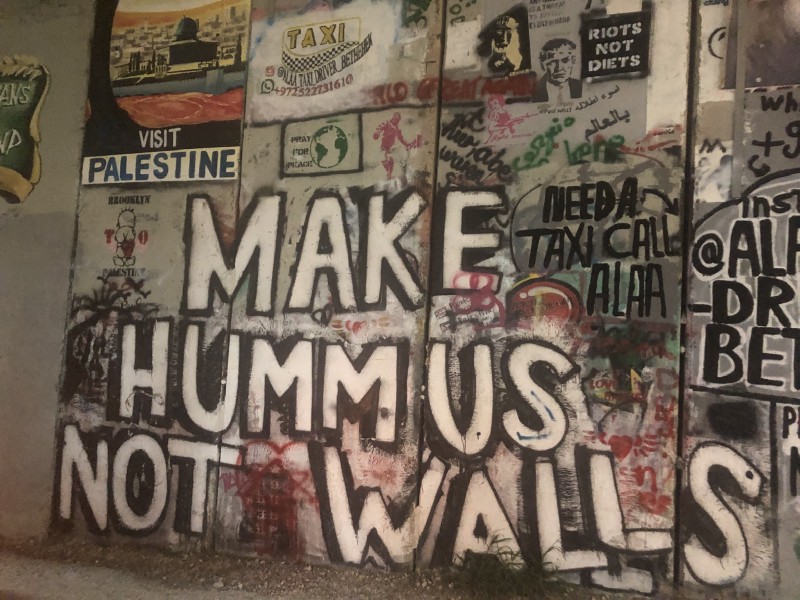
Days 8–11: Meeting my teacher (and my fear) in Jerusalem and Bethlehem
On day 8, my teacher and friend Joann arrives in Tel Aviv from San Francisco, and I venture out in a housemate’s car to pick her up (my first time driving in Israel using kilometers per hour!). Over the next few days, we settle into Jerusalem and Bethlehem together. It is mostly easy: Joann has an incredible ability to meet joy and hold suffering, to show tenderness and care in surprises and intentional gifts, and to strive for equity and balance in our relationship. At once I am a student and an equal, deeply valued and relied upon and constantly learning new ways of being in relationship and community.
Each morning, we sit together for thirty minutes and then share deeply from the heart. If there is conflict, we practice deep listening and empathy to achieve understanding. Joann teaches me the difference between shame and beneficial regret: I can experience regret for the impact of my actions on another person without shaming myself or pointing out my mistakes.
Joann also teaches me to meet my own fear. At the airport, she immediately notices my refusal to take the elevator up to the parking lot: she takes two suitcases up the elevator and I walk up three flights of stairs. In the days to follow, she encourages me to meet this fear and to ask about its origins, to question if it still serves me in this current moment.
At some point, my fear of elevators may have protected me from being stuck in a small space or trapped without anyone able to hear me. But in this moment, what is my fear doing for me?
I see that this fear has become part of my identity (“Melanie doesn’t take elevators”), and that it may limit my choices in the future. Perhaps I won’t go into tall buildings or crowded subway cars; perhaps I will let fear excuse me from meeting bigger difficulties in my life. In looking at my fear of elevators, I see my deep-rooted fears of being invisible to and abandoned by others, and of being trapped on a certain path in life, without the freedom to change course. I see that I can hold space for my fears without letting them dictate my choices.
By calming my body with the resiliency tools, I can enter an elevator without panic. I can notice the electronic display, the brightness of the pressed buttons, the mirror at the back. I can invite my rational brain to see safety in the elevator’s design. And I can give myself the power of choice. I can always walk up stairs, but if my body is tired or I am carrying heavy packages, the elevator can be available as an option.
On day 11, I take an elevator alone from ground to fourth floor without having a panic attack.
That same day, Joann schedules a planning meeting in Bethlehem with Najah, a strong woman who leads community projects for women in Beit Sahour. After lunch of rice, yogurt, and mulukhiyah (green leaf and chicken soup), Joann introduces the tools to Najah. Najah touches her own strength by recalling memories of learning to drive and buying her own car, and confronts her own fears. In this short session, Najah intuitively grasps the tools in her body, and asks us to give three groups of trainings in March: one each for women, teenage girls, and children. Joann invites me to train the teenagers.
With Joann, I am learning to be in relationship to another person on the path, and I am committed to being fully present in each moment we are together. To be present with Joann is to be present with myself: to touch my own feelings and needs with curiosity, and to communicate with honesty and care. For I know that this person in her beauty requires tenderness and gentle words and love, just as I do. I practice meeting her as I meet myself.
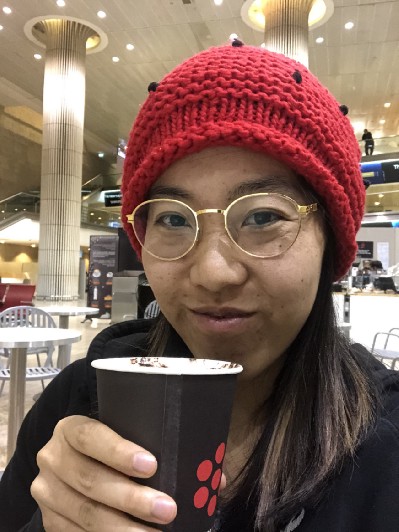
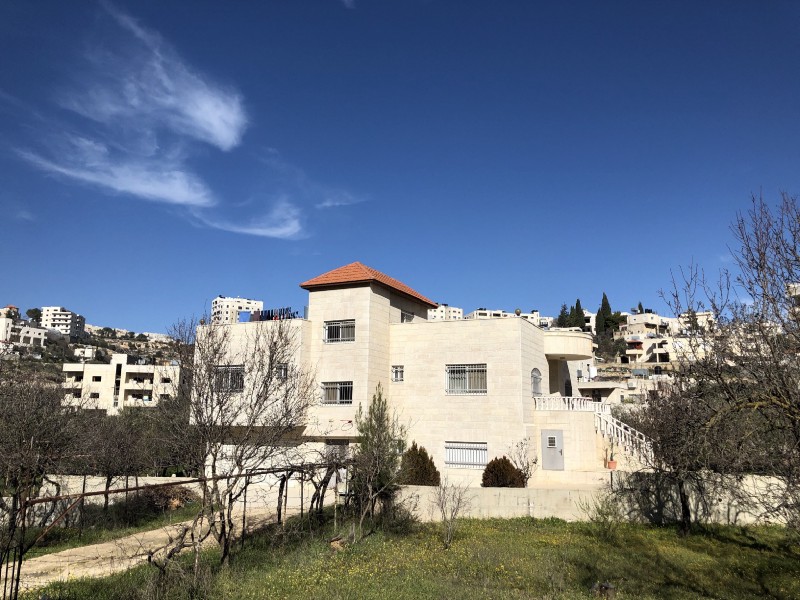
Day 12: Whether you like it or not, this is your sangha now
On day 12, Joann and I venture to a Wake Up sangha meeting at the apartment of Nitzan, a kind young Israeli living in downtown Jerusalem. I am initially hesitant to attend because the meetings are in Hebrew and Joann doesn’t fit the age demographic, but my hope of finding a home sangha gives me courage.
One of the facilitators, Chen, greets the two of us and invites us into the shared space: Nitzan’s bedroom, which has been outfitted with couches, cushions, and an altar. The meeting consists of guided meditation and dharma sharing in Hebrew, led by Chen and Nitzan. Shauna, a lovely person from South Africa, offers gentle translation into English. It is both familiar and entirely foreign to be sitting at a Wake Up meeting listening to Hebrew, translated to English, with Joann by my side.
At first, my limbs feel too big for my body, signaling my discomfort, and it isn’t until after the meeting is over that I can rest and be authentic. In casual conversation, one of the participants shares their desire to meet Palestinians and to learn about their experience, and Joann reveals the existence of an Israeli-Palestinian sangha here in Israel. The group is curious and receptive to this news, and this is a turning point for me. I am finally able to talk about my work in Bethlehem, no longer so cautious of disrupting the peace by sharing my truth.
As we are leaving, Joann and I say goodbye to our hosts. Chen turns to me with a big smile and invites me to return anytime.
“Whether you like it or not, this is your sangha now.”
Day 14: Arriving to Haifa, a town by the sea
On day 14, Joann and I arrive at Haifa’s HaShmona train station and are met by Behayeh, the director of the community center in Halisa, an Arab neighborhood in the hills of Haifa. Our lodging for the month is the Mossawa Center, an advocacy center and non-profit committed to promoting equal rights for Arab Palestinian citizens in Israel. The center is housed in a beautiful building made of limestone, and our rooms look towards the Mediterranean Sea.
The next day, Joann and I meet with the Halisa Community Center staff and volunteers: Behayeh, Haiat, Miriam, and Haiat’s daughter Riham. They are all lovely: Miriam and Haiat have embraced the resiliency tools in their lives and are committed to seeing the program thrive in Halisa. Riham is 18 years old and will be our Arabic-English translator during the meetings. She is incredibly fluent in both languages, managing to capture the nuance and emotion of the Arabic words in perfect English for Joann and me. After the meeting, we marvel at the strength of her translation and the collective excitement of the team.
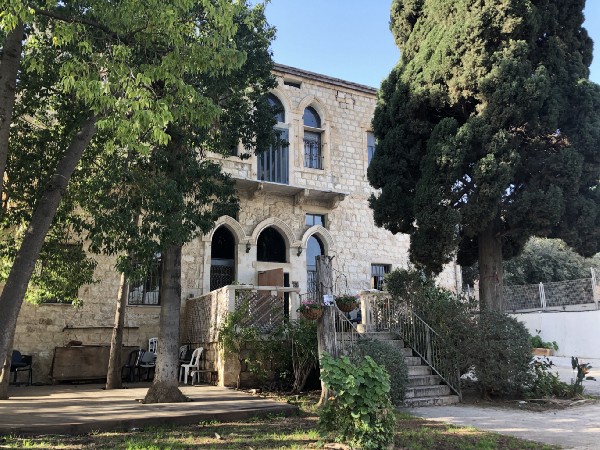
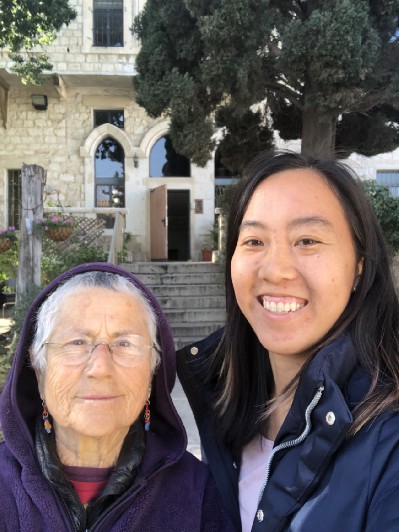
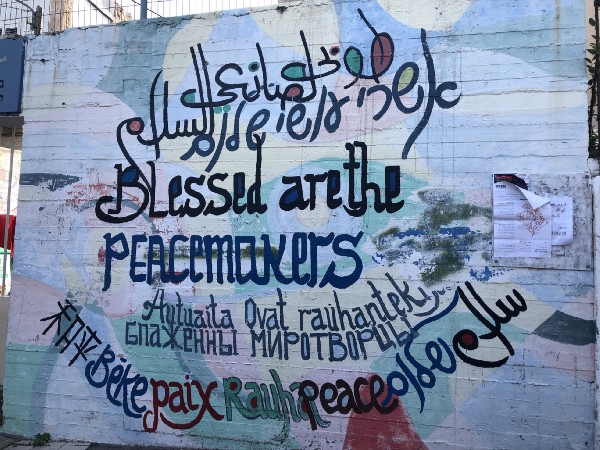
Day 16: Shabbat Shalom, my friend
On day 16, I head home to Jerusalem for a quick visit. It is Friday, Shabbat here in Israel, and I am returning for Kabbalah Shabbat services at the synagogue and for dinner at a friend’s house.
Kabbalah Shabbat is pure joy. I sit next to Rachel, one of Lisa’s friends that has hosted us for Shabbat dinner in days past, and we are together touched by the music. A few minutes in, Lisa appears as a wave of love. She seems to know and embrace everyone, and to be loved and embraced by all. We are dancing in a circle in the corner by now, all of our friends holding hands, singing, letting the energy of the music heal and unite us.
I interpret the invitation of Shabbat as an offering to be present and rest in beloved community, to be held by and to hold each other, to practice letting go of the past week in each song, each breath. It is magic, this celebration of Shabbat, and there is no separation between what is Jewish and what is Buddhist in my soul.
Later that night, I meet a person at Shabbat dinner who volunteers at the Open House in Jerusalem (the main space for people that identify as LGBTQ). They warmly welcome me and connect me to events and to people in the queer community. In this welcome, I am able to invite in and feel my own queer identity, this piece of me that is unsure of its belonging in the religious city of Jerusalem.
Slowly, I am discovering safe spaces where I can be myself — first the Wake Up sangha, now the Jerusalem Open House — and each discovery encourages me to color in more pieces of myself, to celebrate my being, to strive for wholeness in this new home.
Day 17: Whirling with Sufi dervishes
The next day (day 17), Lisa invites me to experience dancing and sharing with her Sufi community in Tel Aviv. The seeds that have been planted in spiritual discussion with Lisa in months past have blossomed into curiosity and desire to explore this new tradition, and I agree to attend with her.
When I arrive at her house before we leave for Tel Aviv, Lisa hands me a bag of clothes I love: the revolution dress from summer camp (that I carried with me to Japan and the states), the dress from gratitude dinner, my favorite grey sweater with a hood. I ask if she’s trying to get rid of the items and she replies no, she just thought that I might like to have them.
The clothes are a beautiful offering. I see that this is one way that Lisa offers love, and I see more broadly the many ways in which we as humans offer each other love. The ways love is presented to me are not always the ways that I would expect or ask for. No, each of us give love in our own time and way, and all we can do — all I can do in this moment with Lisa — is to be grateful and to receive. In this bundle of clothes from my friend, this is the message I hear from the universe.
Being with the Sufis is familiar terrain. We delight in the sunshine and the peacocks that walk freely through our host’s living room. There is a sharing circle and I am deeply touched by the words of the participants: they speak with the wisdom that comes from deep practice and experience, rather than theoretical musing. Lisa translates for me and to receive the Hebrew words from her is a reminder of interbeing. I only understand what I do because another person has chosen to offer me their gift.
And then, we twirl. It is a foreign dance to me, on each in-breath turning in, each out-breath turning out. The left foot is the pivot foot, the right foot the one that steps. The dance is terrifying, dizzying, requires at once incredible focus and release. I cannot think or question or feel self-conscious: the turning is the only thing. By the end, I am dizzy and sit on the side while the participants finish the dance.
As we leave, I ask the host why we turn on our left foot, and she says:
“We turn to the left to turn towards our hearts, and to turn away from time. For when we turn, there is no time.”
Days 18–22: Resilience trainings at the Halisa Community Center in Haifa
Our first day of training in Haifa finally arrives on day 18 (Sunday, February 3rd). Miriam greets us at the community center with trays of homemade food: warak dawali (stuffed grape leaves), tabouli salad with pomegranate seeds, potatoes with dill, schnitzel, cow intestines. She has stayed up late into Saturday evening making every dish by hand, and is joyful to offer it to us. I am amazed by her generosity and desire to contribute, remembering the many ways in which we offer love.
The training is wonderful. By 5:30pm, sixty people have crowded into the largest room at the center, and our team of five (Joann, three translators, and me) are sitting on the stage. Behayeh begins by introducing our team and setting agreements with the group: for confidentiality, quiet, respect for Joann and the trainings. Joann mixes lecture with demonstrations and experiential learning, and most of the audience is focused and engaged. By the end of the first day, twenty-five people have applied for the rest of the workshop, and many approach Joann to ask questions and to offer gratitude.
On Tuesday and Thursday (days 20 and 22), we hold the first of a series of workshops that will train a team of women (and one man!) in the resiliency tools. The workshop is designed in a “Train the Trainer” style, and our hope is that after the workshops end, each of the participants in their own way will be prepared to share the trainings with their community.
I’ve been slowly figuring out my role in the trainings: to help Joann assess the energy in the room in real-time, to make suggestions that help keep people engaged, and to offer movement exercises as needed. On Tuesday, Joann introduces the movement exercises as “something fun”, and I ask people to imitate animals that they think are strong. We go around doing animal movements for a few minutes, and I see how movement can cultivate joy. On Thursday, we follow up with specific animals: wiggling like fish, flying like birds, waddling like penguins.
On day 21, Joann and I visit Akko with our friends and English-Arabic translators, Jenan and Sawsan. After my very first visit to a mosque, I am content and joyful to be wandering the streets and taking photos with the girls. The day is rainy and cool, and as it begins to pour, the four of us arrive at a delicious restaurant, where the menu includes a entire page of hummus varieties. The hummus is chunky and arrives with onions and garlic. It is the best hummus I have ever eaten, without question.
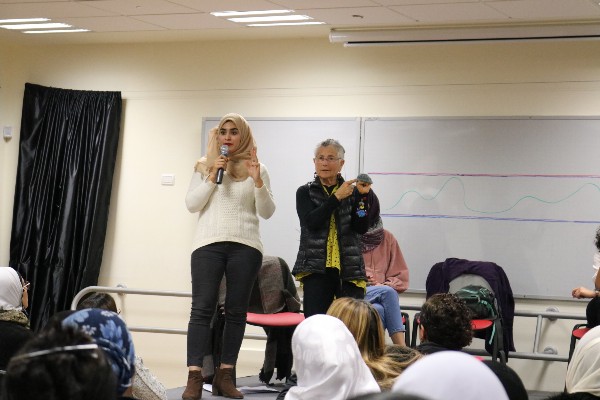
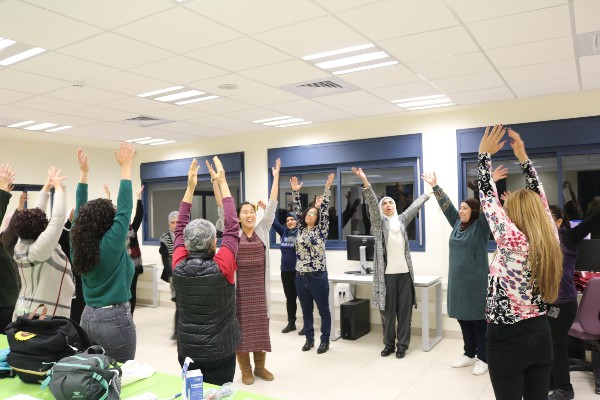
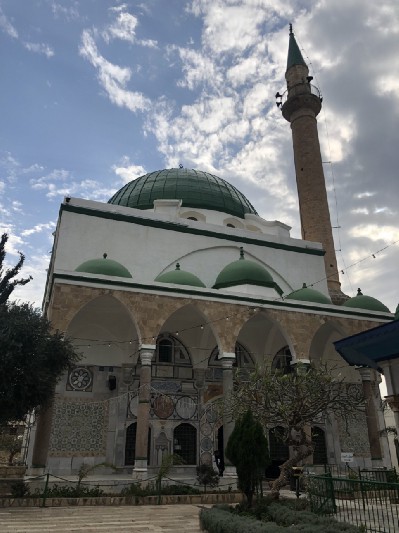
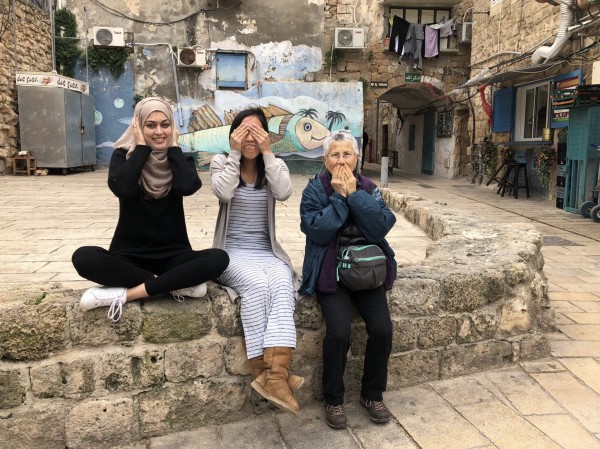
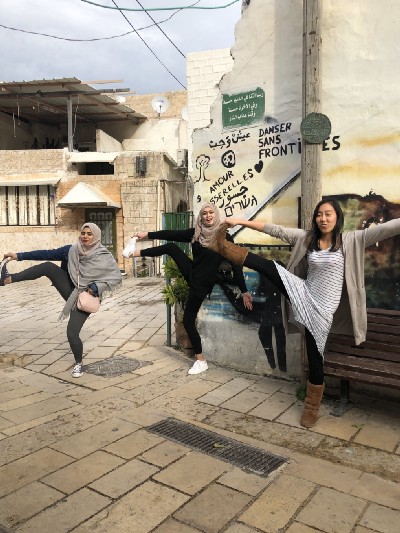
Today
Today is day 25 of my time here in Israel. As I write this note, I wonder how long it will be before I stop counting the days. This is home now, and as days turn into months, perhaps this will all become one glorious blur.
Thank you for reading and listening to my stories, my friend. Your presence in my life encourages me to keep writing and reflecting, and to keep on when things are difficult. I know that while we may live in different places and in different timezones, we are not separate. What I do here in Jerusalem, Bethlehem, and Haifa affects you where you are. And what you do in your home and travels are impacting me here.
I love you and miss you and know that you are here with me.
Love,
Melanie
If you’d like to read updates about my time in Israel-Palestine, please subscribe to my newsletter: https://tinyletter.com/melaniegin
